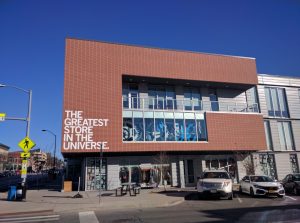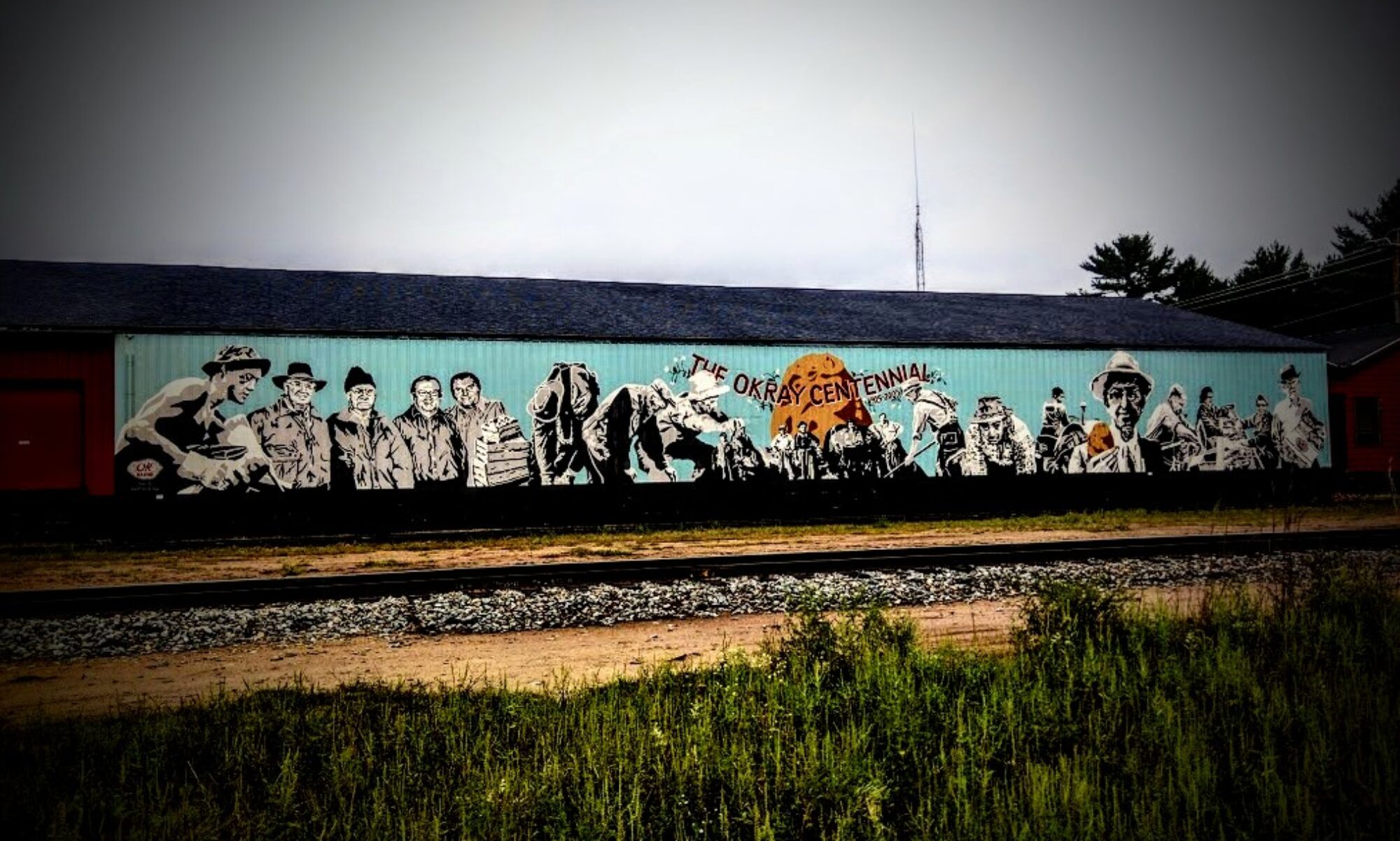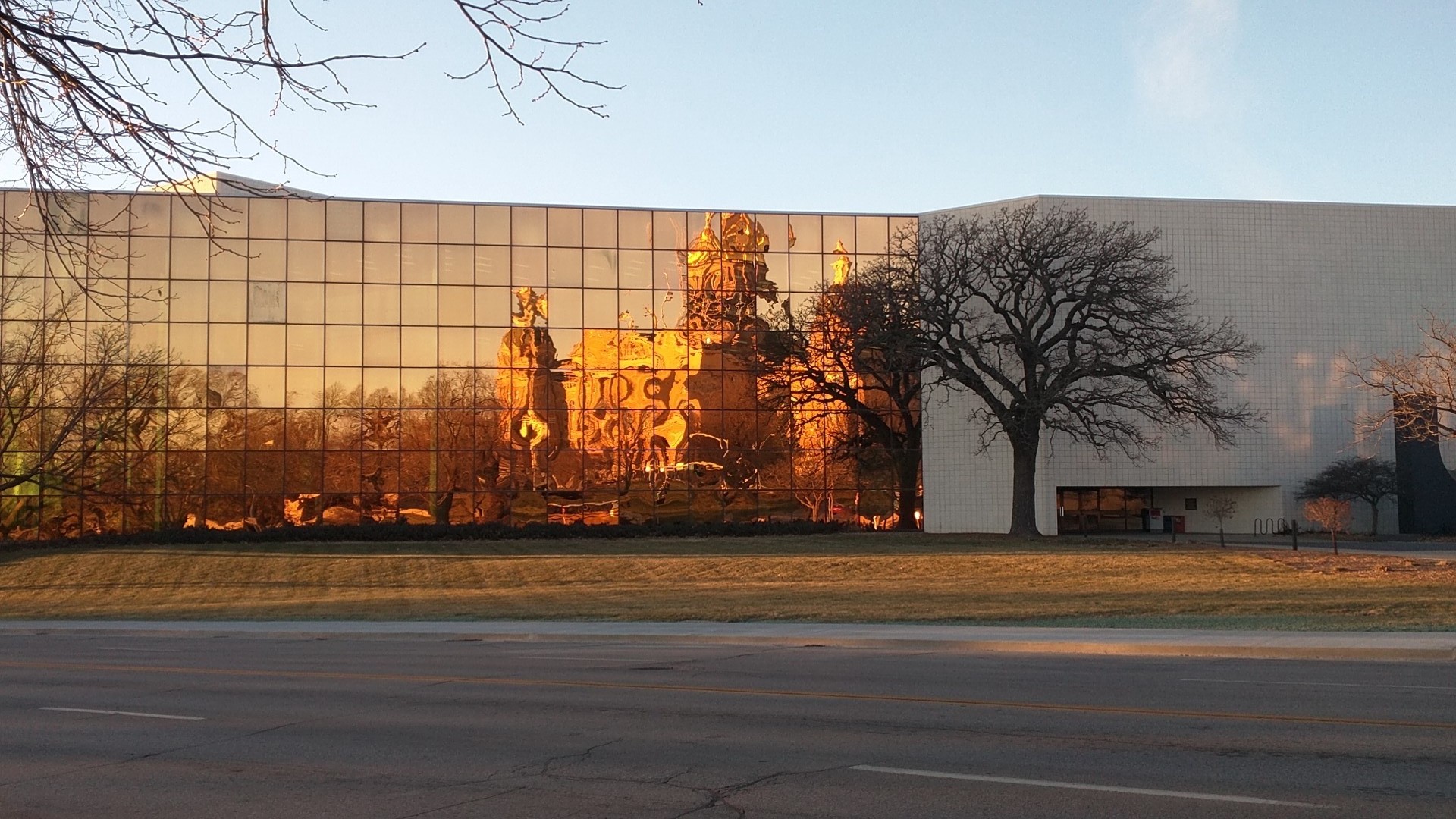Travel to Des Moines, meet a politician you’re writing a dissertation about, visit the mecca of modern Midwestern marketing. It was a good two weeks.
[Yes, I’m posting this a little out of order: This trip took place November 27-December 1 and December 4-8. (A lot out of order.) But in my effort to document everywhere I’ve gone, I’m just posting them as I think of them. I also start teaching on January 17, so these will slow down even further. If you’re a student and reading this, no amount of referencing places I’ve been will make up for not doing the actual assigned reading.]
If you’re new, here’s what Barnstorming the Midwest is.
These two weeks in Des Moines were designed to get my feet wet in the world of Tom Harkin’s political career: from congressional aide to longtime U.S. Rep. Neal Smith, to failed Democratic candidate for Congress (his wife, however, did win the Story County Attorney General election that year, an Iowa first), to U.S. Representative from Iowa’s 5th District (1975-1985), to U.S. Senator (1985-2015) and sometimes presidential candidate (1992).
Easy enough to do in two weeks, right?
As it turned out (and I did know this before I got down there), Harkin’s materials were gifted to Drake University’s Archives and Special Collections only upon his retirement from the U.S. Senate in 2015, along with a generous amount of money to build a palatial second-floor archives space in the campus library. The collection, under the excellent watch of Hope Bibens [CC to Hope: THANK YOU for all your help!], has gotten money to accession these papers quickly, but we’re talking hundreds of feet of material and a few people to do it–it moves slowly. As a result, I was able to get into the Agricultural and Labor working files, having about 15 boxes pulled for my research.
One more note about Harkin: He was a bit of a political mystery to me before I got to Iowa; not because I knew nothing about him, but because I knew that he trended much more liberal socially than I’d expected or seen from mainstream Iowa (despite it having been the first state–in 2009–to affirm the right to gay marriage). What’s more, even Republican friends from Iowa spoke highly of him–saying that while they didn’t always agree with his politics, he represented Iowans. I never got the sense that I did from some Republicans in South Dakota about Tom Daschle, that he’d become too Washington for the “folks back home.” Harkin was a genuinely popular Senator.
So let’s talk about why!
The Research
Collections
Drake University
Tom Harkin Papers (90%)
Robert Ray Papers (3%) – As I was there, I wanted to at least explore a little of why five-term Gov. Robert Ray (1969-1983; term length was amended in 1974 to four years) was so popular. He was a moderate Republican who maintained ratings in the 70% or better range throughout almost all of his career and had a progressive record on race and immigration, particularly for his work in resettling Southeast Asian refugees and protecting Native American burial sites.
State Historical Society of Iowa
Jesse Jackson for Iowa ’88 Campaign Papers (7%)
Findings
Progressive Populism. Look no further; that’s the entirety of my findings. Everything Harkin did, everything he said, everything he fought for, he fought for under the banner of being not just a progressive, not just a populist, but a progressive populist. (If other researchers are reading this, please don’t scoop me on it. I have done way too much traveling for you to ruin it yet.)
Thankfully, Harkin even defined populism for me:
Populism is the belief that citizens working together can make government more responsive to the needs of the people…that government must ensure the economic well-being as well as the political rights of all Americans. Populism doesn’t mean big government – but it does mean strong, effective government – government that is on our side and by our side.[1]
Harkin walked this walk, co-founding the Congressional Populist Caucus in 1983 and hosting events like “Populism ’86,” a convention for politicians, analysts, scholars, and journalists to talk about the history and direction of American populism. Rep. Lane Evans (D-IL17) noted that in 1984 “the only three U.S. Senate seats that went from Republicans to Democrats in Ronald Reagan’s landslide in 1984 were won by members of the Populist Caucus: Tom Harkin of Iowa, Paul Simon of Illinois, and Al Gore of Tennessee” (and that Tom Daschle, a member of the Caucus, was running in 1986). The caucus relied on economic populism, particularly progressive policies (often derided as “redistributive”). As an American Enterprise Institute pollster noted,
Economic populism is the Democratic Party’s strength. After all, without economic populism what does the Democratic party become? It becomes a party of educated, upper-middle-class liberals and of minority groups who are united by a social philosophy. In other words, the Democrats stop being a populist party and they become a liberal party. And that is what I believe the New Populist Forum is designed to prevent.[2]
Tom Harkin led the crusade for progressive populism at the national level, and it was a distinctly Midwestern movement.
It didn’t stop at agriculture. Harkin spoke in front of the American Agriculture Movement in January 1985 in Oklahoma City, just after winning election:
I would propose the formation of a farm-labor populist alliance that can write a farm bill out here on the prairie that can be sent to Washington rather than having Washington tell you what a new farm program will contain.[3]
Not just farm interests; labor, too. If only we had a political party in the Midwest that supposedly represented farm and labor. Maybe even put it right in its name.
Shame none come to mind.
Defending the Midwest was a Harkin priority. Harkin was obviously a staunch defender of agriculture and Iowan interests (usually one and the same), but his correspondence with his staff revealed an attention to Midwestern Democrats that I’ve not seen outside of political campaigns. In the debate over a proposal by Sen. Patrick Leahy (D-VT), supported by Sen. Rudy Boschwitz (IR-MN) to support recourse loans[4], Harkin and a staffer worried over the fate of his regional colleagues if banks could collect on defaulted agriculture loans by going after other forms of property:
Farmers Union thinks this Leahy proposal puts 6 or Senate Senate seats in the Midwest in jeopardy. I cannot understand what Leahy and his people are up to. It is politically dumb.[4]
While this betrays where Harkin got his ag advice from–the liberal Farmers Union, not the conservative Farm Bureau (this isn’t surprising, but I feel I should point it out)–it really shows a disconnect on agricultural policy between Midwestern Democrats and the Eastern counterparts. Harkin and his staff planned to use recourse loans in their reelection campaign against Rep. Tom Tauke, but they showed concern for other farm Democrats who would face reelection fights in 1990 and 1992, like James Exon (D-NE), Paul Simon (D-IL), Kent Conrad (DNPL-ND), and others. In those votes, however, prairie-state Democrats struggled to convince the party of their needs and often split their votes: Other Democrats’ predilection to “accommodating Republicans meant disappointing the prairie-state Democrats, who clearly resented members of their own party giving the Republicans the cover of a compromise rather than a battle.”[5]
Harkin, moreover, appealed to other Midwestern activist groups to embrace the tradition of grassroots populism and apply the lessons of history to their advocacy:
It goes without saying that Wisconsin, a state synonymous with Democratic reform, is creating populist coalitions of its own. Your Wisconsin Action Coalition – by bringing together farmers and working men and women – is a bold and innovative step that the national Democratic Party ought to follow.[6]
If there was any doubt, take it from Sen. Harkin. By my immense, immense luck, The Harkin Institute at Drake was hosting its annual “An Evening with Charlie Cook.” Cook, the political analyst whose Cook Political Report provides a great deal of the baseline knowledge I use in my dissertation, spoke at length about the election of 2016, the role of the Midwest, the future of the Democratic and Republican parties, and the tradition of populism in the Midwest. Hearing him alone was worth the trip down to Des Moines, and while I didn’t get a chance to speak with him after the presentation, I did settle (note the sarcasm)…
For meeting Tom Harkin himself. I lurked around the stage for about 20 minutes just to shake his hand and say hello, and then, to my great surprise, he took 5 minutes out of his evening to talk with me.

Part of the fun and to my mind, necessity, of this project has been approaching it like an outsider. I am not active in political circles of any kind (though I vote and all that jazz, obviously). I worry that, if I meet or work within political contexts, my writing may reflect a more implicit bias than that with which I already write. It isn’t terribly fun to sit on the sidelines for 5+ years, but it gives me a little more of the ability to step back and consider my sources more dispassionately.
But shaking Senator Harkin’s hand, explaining that I was in the archives doing research in his papers, and explaining why has to be one of the coolest things I’ve experienced throughout this process. I’m just going to quote my Facebook post explaining the interaction with Sen. Harkin, because I was so excited when I wrote it that it much better captures what I could do here:
He asked what I did, and I barely got “study progressive populism” (Sen. Harkin’s self-professed political ideology) out of my mouth before he launched into an explanation of why “Charlie” neglected to mention how Democrats could win in rural areas (like he did, Heidi Heitkamp and Collin Peterson do, and more), how populism diverged into racism and progressivism in the 1900s (I got to helpfully supply “Tom Watson of Georgia” for him, so thank you DQEs), and how the Omaha Platform is one of the greatest documents ever written […] And then he said it was great that I was studying what I did AND that he thought it was important and relevant today more than ever.
So that was awesome. And that’s the ultimate finding of my trip to Des Moines: the Senator himself believes it’s right, relevant, and riveting research.
The City
The Lodging
Two different Airbnbs [Airs-bnb?]. One was in Beaverdale, a neighborhood a mile and a half northeast of campus, the other was between Drake and where I-235 runs south of campus. Both comfortable, both quiet, suburban neighborhoods.
The Sightseeing
I did very little. I met a friend, Mike Jones, for a beer and dinner at El Bait Shop, a Des Moines institution just south of downtown, and we alighted to the attached High Life Lounge (in old ’70s decor) for a Grain Belt Premium afterwards (though I could have chosen PBR, Hamm’s, Schlitz, or a number of other adjuncts).
For my location recommendations for food, I enjoyed a really spicy burrito bowl at Fernando’s Mexican Restaurant, just east of campus, that was authentic and tasty. It’s a nice lunch place with to-go and sit-down options. For burgers, a great reuben, and their classic nachos (minus banana peppers for me), The University Library is an institution and has great food, to boot.
The only other real “sightseeing” I did was a very important trip to what I earlier called the “mecca of modern Midwestern marketing”: Raygun!

The always-irreverent retailer, originally intended to sell shirts as positive promotion of Des Moines, has turned into the marketer of all things Midwest, with shirts (I own one), posters (I also own…multiple), notebooks and postcards (again, multiple), and other accessories catering to a generally left-leaning but most importantly, local pride in place.
I needed a new notebook and a few postcards, so I picked those up and got out, because I was about 30 seconds from pulling the trigger on a new shirt, a candle, and some magnets for my new office. If you love the Midwest or Midwestern culture and, more importantly, have money to burn, visit the website or, even better, the store in Iowa City or Des Moines. You won’t be sorry.
The Beer
Des Moines has two “big name” breweries, Exile and Confluence, but I only made it to the former. I did have Confluence’s Des Moines IPA a couple times when I was getting dinner, and it’s nice and piney, with some citrus and caramel flavors to round it out. A nice beer–not one I’d be going out of my way to have, but definitely one I’d enjoy the next time I go back to Des Moines.

Exile itself was beautiful. Located just south of downtown on 15th and Walnut, its taproom has high ceilings, an excellent food menu, and nice views of the brewing space. I’ve had and really enjoyed Exile’s Beatnik Sour (a Top 10 sour in my book), so I was really excited to check it out. As I was driving home, I limited myself to just Sir Moch-A-Lot, a milk stout, and Strawberry Bohemian, a Berliner weisse.

The stout, despite its 7% ABV, was very sweet with a nice big kick of coffee and chocolate. It certainly lived up to its name, and its one I’d bring home for Mom to taste. (That’s not a statement on wanting to marry a beer–I swear, I just do this recreationally–my mom just really likes coffee stouts.) The Strawberry Bohemian led off with some really nice berry flavor, as the name implied, but faded into a tartness that really complimented it nicely. I’d love a few of those on a hot summer day…
…maybe when the Harkin Campaign Files get opened and I have time to come back to DSM and camp.
Other beers from this trip were West O Brewery’s (Okoboji, IA) West O Coco Stout, a sweet stout that was (mercifully) not coconut, as I’d feared, but actually a really good, chocolatey stout, and Keg Creek Brewing Company (Glenwood, IA, wherever that is) Breakdown Brown Ale. Also delicious, would have again.
What’s Next?
I’ve done some trips to Moorhead and Iowa City in the last month and a half, and I will try to get posts about those up, along with a map of all the places I’ve been since I started this barnstorming adventure in May 2017. I am also working on a map of all the archives I visited in 2017-18 on my research grants, so hopefully that will be up in the next day or so. However, I do start teaching on Wednesday the 17th, so we’ll see how many of these I can get through before I’m wrapped up in lectures and syllabi.
If you see me, make me feel bad about not posting more often!
Past Trips
Pierre
Iowa City
Bloomington
St. Paul, St. Cloud
Menomonie
Milwaukee
Iron Range, Lake Vermilion Edition
Grand Forks
River Falls
Iron Range, Biwabik Edition
Bismarck-Mandan
[1] “Address by Senator Tom Harkin,” Wisconsin Jefferson-Jackson Day Dinner, Milwaukee, WI, April 20, 1985, p. 10-11. Thomas R. Harkin Collection, Legislative Working Files Series, 1974-2014, Subseries 1, Box 2, Folder 9. Drake University Archives, Des Moines, IA. [2] “Populism, Politics and Policies,” Populist Message vol. 1 (3), July 1986. Harkin Collection, Subseries 1, Box 9, Folder 57. [3] “Remarks of Sen. Tom Harkin,” American Agriculture Movement Convention, Oklahoma City, OK, January 11, 1985, p. 14. Harkin Collection, Subseries 1, Box 5, Folder 10. [4] Mark Halverson to Tom Harkin, “Farm Bill Markup; Leahy Markup Draft,” June 12, 1990. Harkin Collection, Subseries 1, Box 2, Folder 9. [5] David S. Cloud, “Senate ‘Prairie Populists’ Lose As Panel Approves Farm Bill,” Congressional Quarterly, June 23, 1990, 1954. Harkin Collection, Subseries 1, Box 2, Folder 23. [6] “Address by Senator Tom Harkin,” Wisconsin Jefferson-Jackson Day Dinner, Milwaukee, WI, April 20, 1985, p. 10-11. Harkin Collection, Legislative Working Files, Subseries 1, Box 2, Folder 9.

